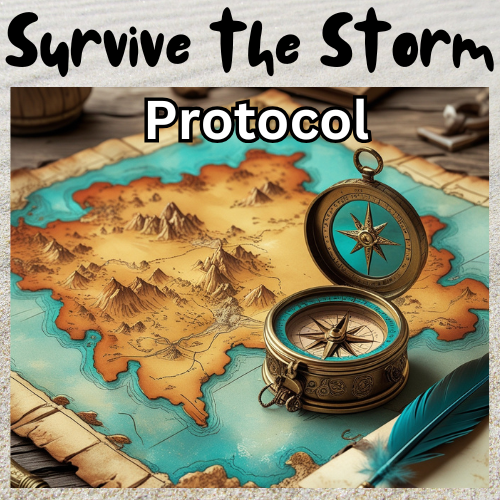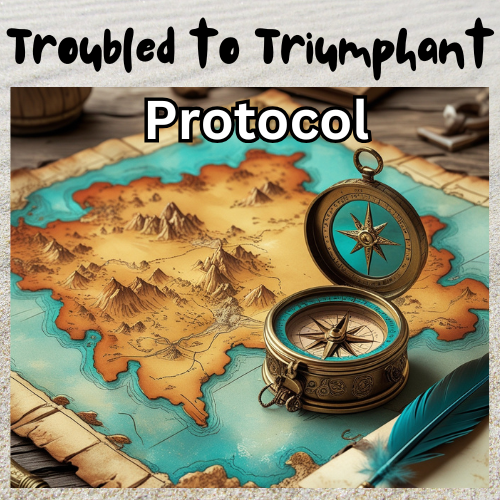Because quitting your job at 42 without a backup plan deserves a little help from a gratitude journal (and a lot of coffee).
Can Gratitude Really Reduce Anxiety During a Life Transition?
The one thing I teach everyone who comes here on a From Troubled to Triumphant Life Transition retreat is that being grateful is an extremely powerful stress management strategy. Gratitude can play a significant role in reducing anxiety during life transitions – I know that from personal experience. NO other strategy comes near, especially if you combine gratitude with generosity. When you are immobilised by uncertainty, acknowledging the positive aspects of life can provide a fresh perspective. We even have a good idea about how it works: we know that practising gratitude helps regulate the sympathetic nervous system, which activates anxiety responses and reduces cortisol levels—the stress hormone—leading to increased resilience. By training your mind to focus on what you are grateful for, you can counteract the anxiety and apprehension that characterise most life transitions. Simple strategies such as keeping a gratitude journal can effectively rewire your brain to handle stress more effectively and reduce anxiety during significant life transitions.
In my free 7-part e-Course, How to Survive a Life Quake, I devote one full part to Gratitude and how you can seamlessly incorporate a Gratitude Practice into your busy everyday life. You can get access to this course by subscribing to my Savoir Vivre Vignettes newsletter.
Shirley N., one of my retreat guests, opted for a coaching package before her retreat. When we met, she had just handed in her resignation letter. This is her story:
So here I am, 42 years old, staring at my laptop with a mix of dread and excitement because I just sent in my resignation letter. 😬 Yep, after 18 years in the same post, I’m officially jumping off the hamster wheel.
And before you ask: no, I don’t have a solid backup plan. Not really. What I do have is a vague dream of becoming a writer-slash-life-coach-slash-whatever-keeps-my-lights-on. Oh, and a crippling case of anxiety that’s decided to camp out in my chest 24/7 since I made this decision. Fun times.
But let me back up and explain how I got here—and why I’m trying this thing called “gratitude” suggested by my coach, dr Margaretha Montagu, as my secret weapon to survive the chaos.
The Decision That Started It All
About three months ago, I was sitting at my desk in my office (read: beige box of existential despair), proofreading yet another soul-sucking report when it hit me: I can’t do this for another decade. It wasn’t just the boredom; it was the constant feeling that my life was going down the drain. You know that scene in The Matrix where Neo wakes up in a pod and is like, “Wait, this is my life?!” Yeah, it was kind of like that.
I thought I’d feel liberated the second I decided to quit, but instead, my brain went into overdrive: What if this is the dumbest decision of your life? What if you never find another job? What if you end up having to sell your furniture on Facebook Marketplace just to pay rent?
Anxiety became my new roommate, and let me tell you—she’s messy, she’s bossy, and she refuses to be quiet.
Discovering Gratitude (Sort of By Accident)
When my coach suggested starting a gratitude practice, I wasn’t convinced. Honestly, I thought gratitude was one of those Pinterest board words people slap on pictures of sunsets to sound profound. 🙄 But one sleepless night, after scrolling through way too many Reddit threads about career regrets (bad idea, by the way), I decided I was going to have to give it a try.
The logic was simple, after all: when you focus on what you’re thankful for, your brain has less bandwidth to spiral into worry mode. It sounded… nice? Sceptical me wasn’t sold, but desperate me was like, What’s the worst that could happen?
My (Wobbly) Gratitude Experiment
The next morning, I grabbed an old notebook, poured a cup of coffee (because a girl has to have priorities), and sat down to write three things I was grateful for. Easy, right?
Not exactly. My brain was so used to cataloguing stress that it couldn’t think of anything even remotely positive. After staring at the page for ten minutes, I finally came up with:
- Coffee (obviously).
- My dog, Biscuit, both my therapist and my shadow.
- That one time last week when the grocery store had avocados on sale.
Earth-shattering stuff, I know. But here’s the thing: it felt good to write those down. Not amazing, not life-changing—but good. It was like giving my brain a tiny break from its regularly scheduled programming of “What If Everything goes horribly WRONG?”
How Gratitude Became My Anxiety Buffer
As the days went on, I kept up the gratitude practice, jotting down three things every morning. Some days were easier than others. (Pro tip: if you ever try this, it’s totally okay to repeat “coffee” as many times as necessary.) But gradually, I started noticing a shift.
For example, when my anxiety would flare up—like the time I checked my bank account and realised I’d forgotten to cancel a subscription AGAIN—I’d stop and think, Okay, what’s one thing that’s going right? Sometimes it was small, like, “At least I’m not dealing with Karen from HR anymore.” Other times, it was bigger, like, “I have people in my life who support me, even when I feel like I’m losing my mind.”
It didn’t erase the anxiety, but it gave me a little breathing room. And in those moments, I felt just the tiniest bit less panicked—and a little more hopeful.
Science-backed Stuff (because I do NOT believe everything I hear)
Because I’m me and I love overthinking everything, I started researching why gratitude might actually work. Turns out, there’s legit science behind it. Practising gratitude activates the part of your brain responsible for positive emotions and can even lower cortisol (aka the stress hormone). (1) (2)
I also learned that gratitude and anxiety can’t really coexist. It’s like trying to listen to two songs at once—your brain will pick one track to focus on, and gratitude tends to drown out the panic. Or, at least, it turns the volume down a notch.
Who knew my cheesy little notebook entries were rewiring my brain?
The Unexpected Perks of Gratitude
Okay, here’s where things got weird (in a good way). As I kept up my gratitude habit, I noticed some surprising side effects:
- I stopped catastrophising as much. Instead of assuming every minor setback was a sign I’d end up as a bag lady, I started looking for the silver linings. Missed a deadline? Great, more time to do it right. Stubbed my toe? Okay, that one still sucked, but you get the idea.
- I became more present. I used to spend 90% of my day stuck in “what if” mode. Gratitude pulled me back into the here and now, even if just for a few minutes at a time.
- I started sleeping better. Not every night—let’s be real—but enough that I felt like a semi-functioning human again. Apparently, ending the day with a gratitude list helps your brain chill out before bed. Who knew?
Gratitude Isn’t a Magic Cure (But It Helps)
I’m not going to lie and say gratitude fixed everything. I still wake up some mornings feeling like I’ve made the biggest mistake of my life. I still overthink, stress out, and occasionally cry into a bag of chips. (Salt and vinegar, for those wondering.) But the difference is, those moments don’t feel as overwhelming anymore.
Gratitude hasn’t made my problems disappear, but it’s given me a tool to deal with them. It’s like having a flashlight when you’re wandering through a dark forest. Sure, you’re still in the forest, but at least you can see where you’re going.
Where I’m At Now
Fast forward to today, four coaching sessions behind me and packing for my From Troubled to Triumphant Life Transition retreat: I’m still figuring out my next move, still nervous about the future—but also, for the first time in years, I’m excited. And when the anxiety starts creeping in, I remind myself to pause and look for the good stuff. Even if it’s just coffee and avocados.
So if you’re in the middle of a big life change and your brain won’t stop spinning worst-case scenarios, try this gratitude thing. Start small. Write it down. Say it out loud. Heck, yell it into the void if that helps.
And remember: no matter how messy or uncertain life feels, there’s always something worth appreciating—even if it’s just the fact that avocados were on sale last week. 🥑
Research
Several scientific studies have demonstrated the link between gratitude and reduced anxiety symptoms that Shirley mentions above:
- A meta-analysis of 64 randomised clinical trials found that patients who underwent gratitude interventions experienced a 7.76% reduction in anxiety scores compared to control groups, as measured by the Generalized Anxiety Disorder (GAD-7) scale (The effects of gratitude interventions: a systematic review and meta-analysis Geyze Diniz, Ligia Korkes, Luca Schiliró Tristão PMCID: PMC10393216 PMID: 37585888.)
- Research by McCraty and colleagues showed that participants who felt grateful had a marked reduction in cortisol levels, the stress hormone, leading to better cardiac functioning and increased resilience to emotional setbacks. (McCraty, R., & Childre, D. (2004). The grateful heart: The psychophysiology of appreciation. In R. A. Emmons & M. E. McCullough (Eds.), Series in affective science. The psychology of gratitude (pp. 230–255). New York, NY: Oxford University Press.)
- More Research and References
Practising gratitude can help reduce anxiety symptoms through various physiological and psychological mechanisms, including regulating stress hormones, modulating brain activity, and shifting focus to positive aspects of life.
Finalement
So, there you have it—gratitude won’t pay your bills or magically map out your future, but it might just keep you from having a full-blown meltdown while you figure things out. Think of it as emotional duct tape: not perfect, but surprisingly effective even if you need to go write “coffee” in your gratitude journal at least three times a day. 😉
In a world that feels increasingly unstable — politically, economically, emotionally — what will you do when the rug is pulled out from under you? That’s why I created Survive the Storm — a 7-part online course designed to be a lifeline during a life quake. This is your personal survival toolkit for uncertain times — lovingly crafted and packed with practical tools, emotional support, and soul-nourishing insights to help you stay grounded, resilient, and resourceful when everything around you feels like it’s falling apart. Enrol in How to Survive the Storm Protocol, with or without additional mentoring.


Author Bio: Dr Margaretha Montagu – described as a “game changer”, “gifted healer”, “guiding light” and “life-enriching author” – is an experienced medical doctor, a certified NLP practitioner, a medical hypnotherapist, an equine-assisted psychotherapist (EAGALAcertified) and a transformational retreat leader who guides her clients through life transitions – virtually, or with the assistance of her Friesian and Falabella horses, at their home in the southwest of France.
Hit the pause button and regain your footing during a From Troubled to Triumphant Retreat. Imagine walking a peaceful stretch of the Camino de Santiago, where every step helps untangle the mental clutter or spending time with gentle Friesian horses who teach you the art of mindfulness. Whether you choose to make a change or are forced to, this retreat offers the perfect blend of peace, perspective, and playful exploration to help you rise from troubled to triumphant!


